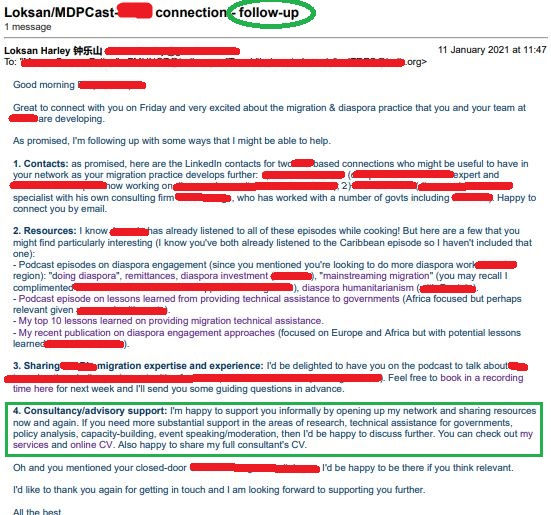The IDEAL way to follow up after meeting a potential new consulting client
- Loksan

- Apr 23, 2021
- 3 min read

OK, so you're a freelance international development consultant and you've just had a meeting with someone who you think could become your client. How do you move from "that was a nice meeting" to "this is how I can add value to your organisation" in a way that doesn't appear like you're a pushy salesperson?
I'm going to share with you how I do this through an email that I sent to a potential client recently (by the way, I'm an independent migration specialist). It might be exaggerating to say it's the "IDEAL way" to respond but I thought I'd share how I do it!
First of all, take a look at the email and think/note down what you notice (I've made some edits to hide personal and other info specific to our correspondence):

So what did you notice?
Here are some of the core elements to the potential client follow-up approach:
Help and add value to them first: In my experience, clients want to work with you if they know, like and trust you. By helping others, you generate goodwill and demonstrate your own value. High-value consultants have good networks and ultimately solve problems for their clients, so if you can do that in your first email, you've already given them a taste of the value you have to offer.
Give them a freebie: Okay, so this is of course continuing the point above about adding value. Content marketing (blogging, podcasting, etc.) may seem like a fruitless endeavour when you count their direct views and engagements. But creating knowledge and sharing lessons learned is creating digital assets. You can use and re-use them over and over again to create value for others, all the while demonstrating your expertise and authority on your specialism.
Inject your personality: Again, see the point on "know, like, and trust". We're working in a human business. People like to work with people who are pleasant to work with. Authenticity is key. Be yourself. See the point I made, "I know [YOU] listen to all of these episodes [of my podcast] while cooking". This is something personal that the person mentioned on our call. I've injected humour and a bit of my own personality. I'm building a relationship with them. As a side note, many know me as a Tottenham Hotspur football fan and I lose count of the number of connections I make with clients potential, past, and present as a result of a shared sporting interest.
Save "the sell" for the end: Hands up if you are worried about coming across as a slimy salesperson? If your hand is up then you're in the majority who feel that way. Part of this is about developing expertise, building confidence and getting over "the imposter syndrome". This goes beyond the scope of this article. However, this is why you save "the sell" for the end of the communication... or perhaps even for your next meeting. You will have seen in my email that by the time I come to talk about myself, I have already offered them free connections, resources, and the chance to appear on my podcast (big deal, right!? :D). So why shouldn't I at the very least tell them what paid services I offer?
Follow up when you say you'll follow up: Again, "know, like and trust". Trust is built when you do what you say you're going to do, when you say you'll do it. This organisation contacted me via LinkedIn to propose a meeting. I arrived at the (virtual) meeting on Friday afternoon on time. I then said I would follow up on Monday morning. That's exactly what I did.
Play the long game: In reality, this email might lead to nothing. Emails like these frequently do. Business development is a slow and iterative process of cultivating a network of influence and building your authority and relationship with that network over time. And some factors are beyond your control (your client may not be in a position to engage you right now for lack of budget, timing, or otherwise). But if you consistently embed these tips into your communications with potential clients and others in your network, you will project competence and those organisations will either come back to you when they need you or refer you to other potential clients.
Anyway, I hope you find this useful. It's an art more than a science and very important to write in your own style (again, be authentic and convey your own personality).
If you want to receive more support for your freelance consulting career, join us at the Impact Consulting Hub and gain instant access to the first meeting recording and future meetups and discussions.



Thanks Transparity